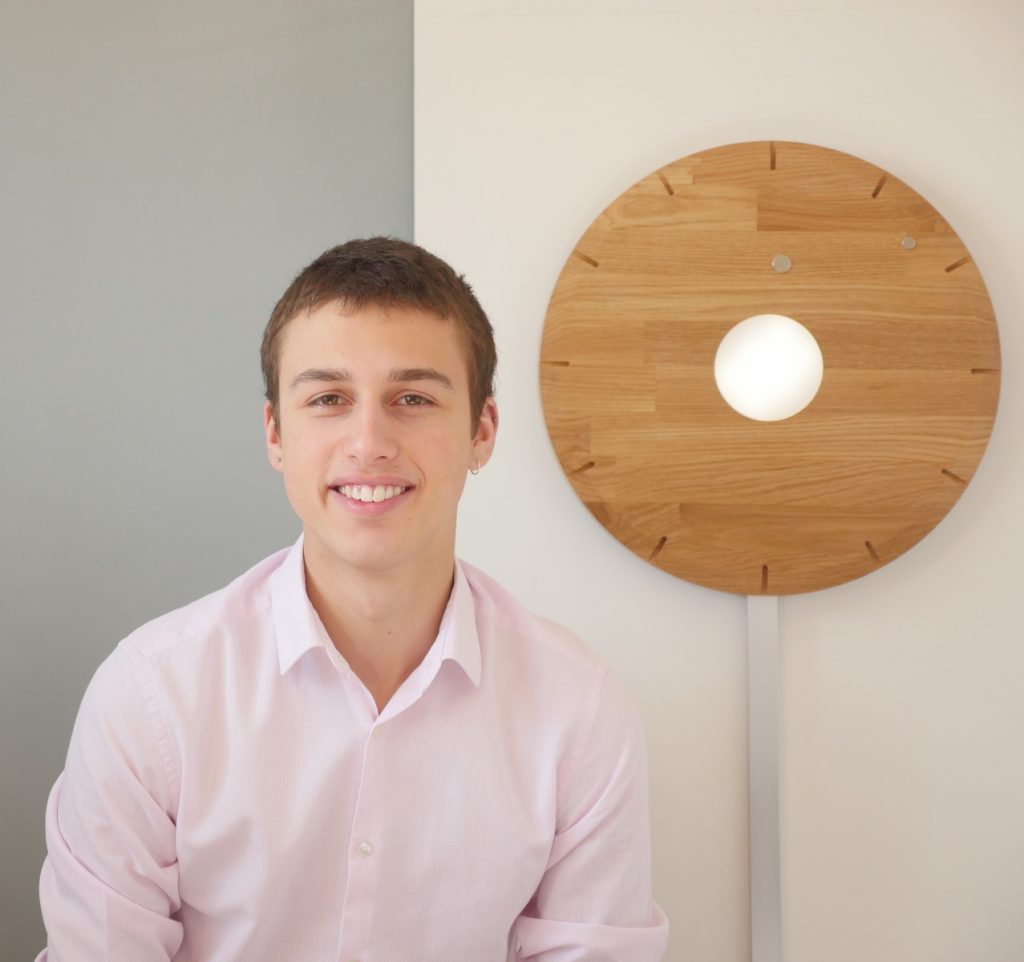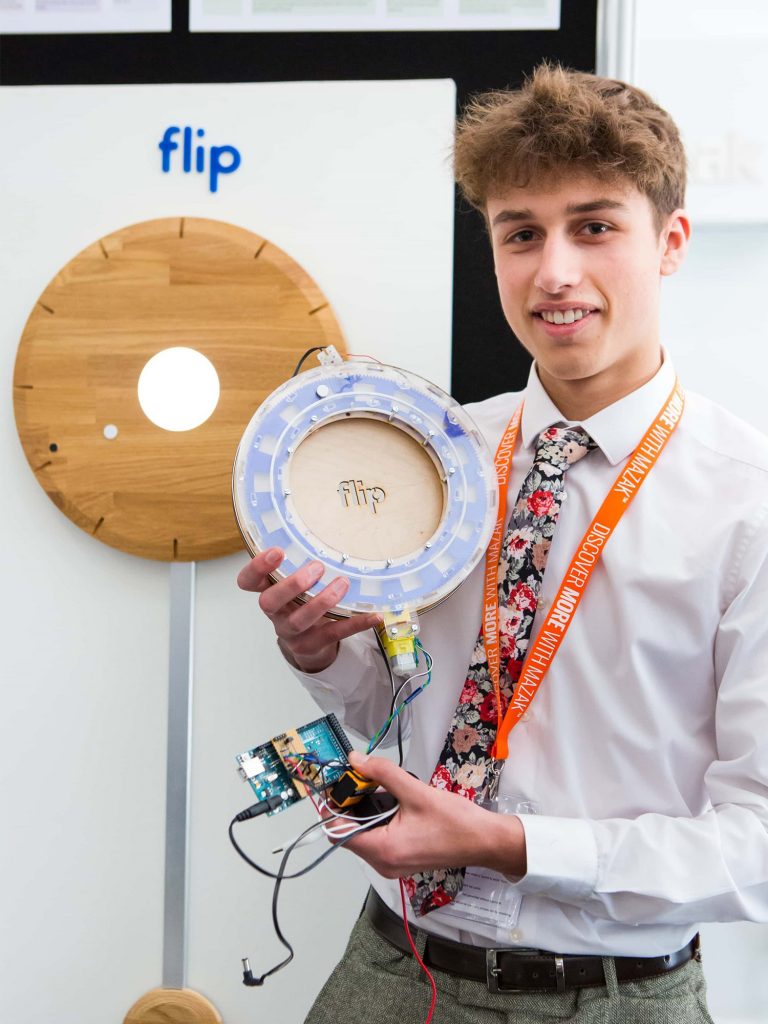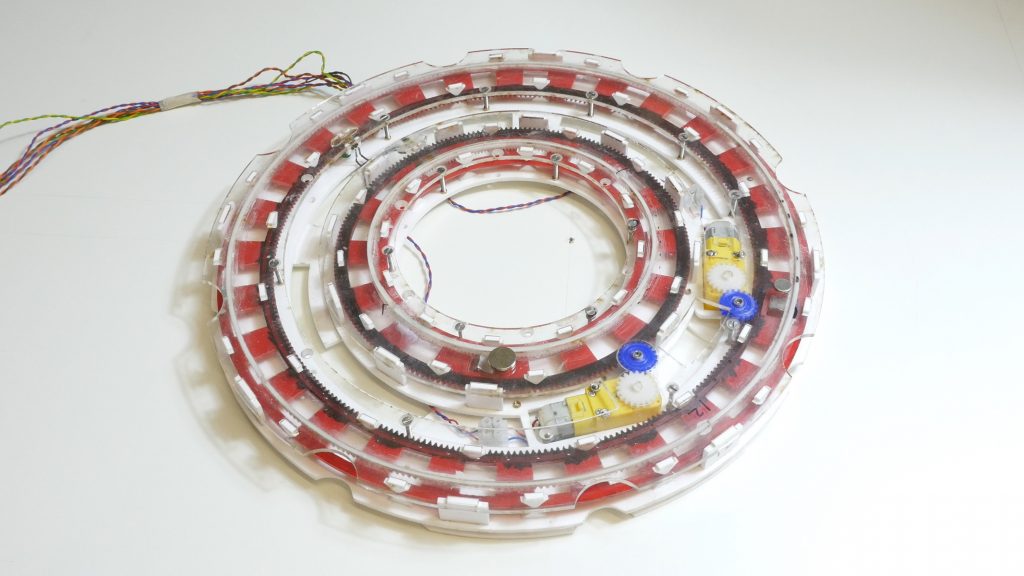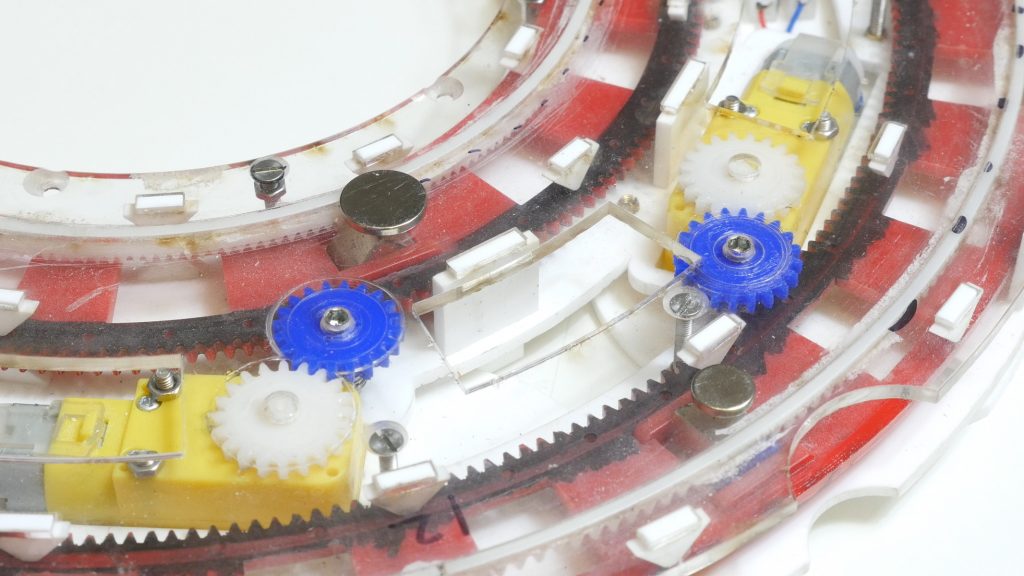Meet Chris Kalogroulis, GSK UK Young Engineer of the Year 2020 and Futurum’s Youth Ambassador for Engineering
Chris combined his skill in mechanical and industrial design to create his innovative magnetic ‘Flip’ clock and take the title of GSK UK Young Engineer of the Year at the Big Bang Competition, 2020. Innovative and ambitious, Chris tells us about his passion for all things engineering and his aims for the future
WHAT MOTIVATED YOU TO ENTER THE BIG BANG COMPETITION?
I originally entered my product, Stackamals (www.stackamals.co.uk 3D models with hidden storage), in 2017 after a lot of persuasion from my DT teacher. I hadn’t wanted to because I thought my project wasn’t good enough, but I ended up winning a big prize. Ever since I started designing Flip – a minimalistic clock that uses magnets in its mechanism – I knew I wanted to enter again and 2020 didn’t disappoint!
WHAT FRUSTRATIONS DID YOU ENCOUNTER ALONG THE WAY?
I specifically chose a project that would challenge me and force me to learn new things; naturally, I came across lots of obstacles! For example, I went quite far down the route of using electromagnets to flip the hands of the clock but realised, after testing, that they were impractical.
After the initial research, I had a clear idea of how the clock would look and function, so I was able to overcome these challenges and finished with a clock that was very close to my vision. I believe I won the competition because my design was striking, innovative and used a real mix of engineering and design skills.
WHO OR WHAT INSPIRES YOU?
It gives me pleasure looking at well-designed products, so I create folders of these that I can refer to for inspiration. One designer I really love is Dieter Rams and I use his 10 principles of design on any product I’m designing. A big part of my passion for engineering also comes from my parents who are both engineers and studied at Imperial like me. I grew up in a household where there wasn’t the option of replacing a broken object; we always had to try and fix it! My favourite toy was always Lego and, as I got older, I started to teach myself mechanical engineering with LEGO Technic.
WHAT ARE YOUR AMBITIONS FOR THE FUTURE?
Ultimately, I want to do what I love for a living, which is making products that give people joy. I’m planning on setting up a company with my brother, Aran, who is very similar to me but with a slightly different skill set – he studies Product Design and Technology at Loughborough University and so focuses on industrial design, whereas I focus more on engineering.
I want to develop the Flip brand further. I’m lucky because my next university modules are electronics, computing and human centred design, so I’m going to take this opportunity to apply everything I’m learning to my Flip clock so I can do well on my course and improve the design even further. My plan is to launch Flip on Kickstarter in the near future, so watch this space!
My ambition is to establish a design company with my brother so that we can build a name for ourselves and create products we love and that people want to own.
I originally entered my product, Stackamals (www.stackamals.co.uk 3D models with hidden storage), in 2017 after a lot of persuasion from my DT teacher. I hadn’t wanted to because I thought my project wasn’t good enough, but I ended up winning a big prize. Ever since I started designing Flip – a minimalistic clock that uses magnets in its mechanism – I knew I wanted to enter again and 2020 didn’t disappoint!
WHAT FRUSTRATIONS DID YOU ENCOUNTER ALONG THE WAY?
I specifically chose a project that would challenge me and force me to learn new things; naturally, I came across lots of obstacles! For example, I went quite far down the route of using electromagnets to flip the hands of the clock but realised, after testing, that they were impractical.
After the initial research, I had a clear idea of how the clock would look and function, so I was able to overcome these challenges and finished with a clock that was very close to my vision. I believe I won the competition because my design was striking, innovative and used a real mix of engineering and design skills.
WHO OR WHAT INSPIRES YOU?
It gives me pleasure looking at well-designed products, so I create folders of these that I can refer to for inspiration. One designer I really love is Dieter Rams and I use his 10 principles of design on any product I’m designing. A big part of my passion for engineering also comes from my parents who are both engineers and studied at Imperial like me. I grew up in a household where there wasn’t the option of replacing a broken object; we always had to try and fix it! My favourite toy was always Lego and, as I got older, I started to teach myself mechanical engineering with LEGO Technic.
WHAT ARE YOUR AMBITIONS FOR THE FUTURE?
Ultimately, I want to do what I love for a living, which is making products that give people joy. I’m planning on setting up a company with my brother, Aran, who is very similar to me but with a slightly different skill set – he studies Product Design and Technology at Loughborough University and so focuses on industrial design, whereas I focus more on engineering.
I want to develop the Flip brand further. I’m lucky because my next university modules are electronics, computing and human centred design, so I’m going to take this opportunity to apply everything I’m learning to my Flip clock so I can do well on my course and improve the design even further. My plan is to launch Flip on Kickstarter in the near future, so watch this space!
My ambition is to establish a design company with my brother so that we can build a name for ourselves and create products we love and that people want to own.

Chris Kalogroulis, GSK UK Young Engineer of 2020 and Futurum’s Youth Ambassador for Engineering
MEng Design Engineering Imperial College London, UK
A-LEVELS:
Maths, Further Maths, Physics, Design & Technology
INTERESTS:
Music, being outdoors, reading, photography and filmmaking.
GCSEs:
Maths, Further Maths, Electronics, Computing, Design & Technology, Physics, Chemistry, Biology, English Literature, English Language, Geography, Religious Education, French
SUPER SKILL:
Chris is a black belt in jujitsu!
“Design Engineering is the fusion of design thinking and engineering knowledge and practice. A good design engineer is someone who loves designing and makes a fully rounded product, so, enjoy yourself and don’t limit yourself to a specific section of engineering.
If you’re thinking of entering a competition, stop thinking about doing it and do it! If you’ve got a project you really believe in, no matter whether or not you win, you’re going to have such a valuable experience. Also, really put your all into presenting your project because if people see your enthusiasm they are going to want to listen.
I’ve learnt that with a passion for something, I work really hard, I overcome obstacles, and I achieve what I set out to do. I love challenges – I find them exciting and feel rewarded throughout the whole process, not just at the end. I advise you to do the same!”
DIETER RAMS’ 10 PRINCIPLES OF GOOD DESIGN:
- Good design is innovative
- Good design makes a product useful
- Good design is aesthetic
- Good design makes a product understandable
- Good design is unobtrusive
- Good design is honest
- Good design is long-lasting
- Good design is thorough down to the last detail
- Good design is environmentally-friendly
- Good design is as little design as possible
These principles inspire Chris. How could they help you?




